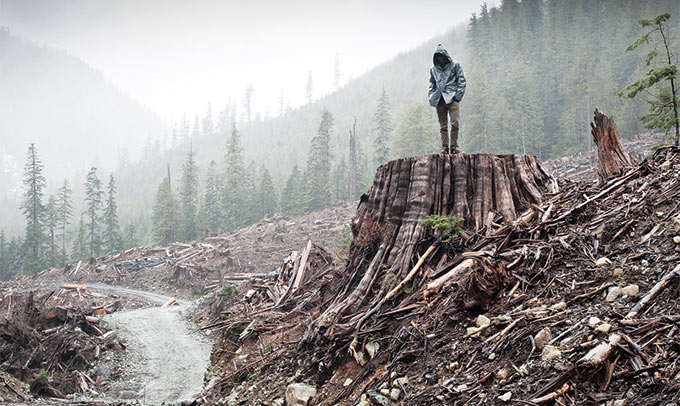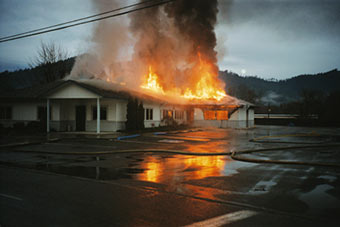If a Tree Falls: A Story of the Earth Liberation Front
by Geoff Kelly

Local premiere of an award-winning documentary hosted by a former spokesman for the radical environmental group
In the mid-1990s, in Eugene, Oregon, a band of radical environmentalists formed what would become one of the most prolific cells of the Earth Liberation Front, or ELF, in the United States. Between 1996 and 2001, this cell, sometimes acting alone and sometimes acting in concert with other ELF cells in the Pacific Northwest, did damage in the tens of millions of dollars to dozens of targets that they associated with wanton destruction of the natural environment. The most visible of the group’s actions may have been the October 1998 arson of a controversial expansion of a ski resort in Vail, Colorado, which caused $24.5 million in damages.
In 2001, in another spectacular attack that contained the seeds of the group’s dissolution, ELF guerrillas simultaneously torched a lab at the University of Washington is Seattle and a tree farm in Clatskanie, Oregon, both sites suspected of engaging in experimentation with genetic modification on plant life.
Those five dramatic years of high-profile, radical action are the subject of a new, award-winning documentary called If a Tree Falls: A Story of the Earth Liberation Front by filmmakers Marshall Curry and Sam Cullman.
Through extensive interviews with activists and law enforcement agents, and with the help of remarkable archival footage, the film explores the Eugene cell’s roots in the increasingly radical environmental movement of the Pacific Northwest to its denouement, which is framed by the arrest and prosecution of 14 members of the cell, most especially MacGowan, 37, whose story is the film’s centerpiece.
The film’s local premiere takes place next Thursday, July 21, 7pm, at 420 Connecticut Street, in a storefront being renovated to house a radical bookstore and reading room by the husband-and-wife team of Leslie Pickering and Theresa Baker, with the help of friends in Buffalo’s activist community. The screening will serve as a sneak peek at the venue, which is intended to open its doors in September.
Pickering has a unique perspective on the story the film tries to capture. While the Eugene cell’s notoriety sprang from the boldness of its actions, it was abetted by an energetic press campaign waged on ELF’s behalf by Pickering and his partner, Craig Rosebraugh, through the Portland, Oregon-based North American Earth Liberation Front Press Office.
At the time that the Eugene call was forming, Pickering was a member of a Portland activist group called the Liberation Collective, the ideology of which closely matched that of ELF and the organization from which ELF sprang, the Animal Liberation Front: Racism, sexism, degradation of the environment, and a host of other ills are all symptoms of a society supported by a fundamentally perverted value system. The Liberation Collective’s activities centered on protests against animal experimentation, animal vivisection, genetic modification, and cloning, and the group had gained a reputation for its willingness to engage in less-than-passive resistance: chaining themselves to buildings, minor property damage, disorderly conduct at protests. “By the time I was 19 I’d been arrested a half dozen times,” Pickering says.
The collective produced a newsletter, which sang the praises of the Animal Liberation Front and its tactics, which would soon be adopted and expanded by ELF. So, Pickering says, “When ELF started taking its first actions, they sent their communiqués straight to us.”

There ensued a brief debate about what to do with that first communiqué, claiming credit for the firebombing of a forest ranger station. Pickering says there were three options: Ignore it; take it to the FBI and wash their hands of it; or turn it into a press release, send it out, and prepare to answer questions about the arson and ELF’s motives. The first two options were not serious contenders.
There were a few more actions and communiqués in the following year. After the Vail ski lodge arson in 1998, Pickering says, receiving communiqués from ELF and representing the group’s actions to the media was his full-time occupation. By 1999, the communiqués were coming almost once a month, and the actions were averaging $1.5 million in damages.
As available spokespeople for an underground group that could not speak for itself without risking exposure, Pickering and Rosebaugh compelled news media, which may otherwise have been inclined to report the arsons as uncontextualized crimes, to report at least in passing the motives of the arsonists. “It was never positive,” Pickering says of the media attention, but at least some of the message trickled through: These fires were the work of activists who believed that something was fundamentally wrong with American society, and that the only way to get people to pay attention to those problems was to do damage to those capitalist endeavors that were both symptoms and perpetuators of the problem.
Pickering and Rosebaugh did their best to emphasize the line between the underground activities of ELF and their roles as spokespeople for ELF and individual dissidents. (As it turned out, the distinction was not so clear to law enforcement.) Indeed, they’d never even witnessed the aftermath of an ELF action until the simultaneous fires at University of Washington and the Jefferson Poplar Farm.
By that time, the media in the Pacific Northwest were well familiar with Pickering and Rosebaugh, and a reporter immediately called for comment on the coordinated arsons on the assumption that they were ELF’s handiwork.
The tree farm was not far from where he was living, so they drove up to see the ruins. Reporters were pestering ATF and FBI agents as they sifted through ashes, Pickering says, then flocked to the activists when they pulled up. When the FBI followed the media’s interest, they jumped in their car and drove away.
Logistically, it had been a huge operation: simultaneous fires, coordination across state borders, one communiqué, lots of damage. But it soon came out that the attack on the Jefferson Poplar Farm had been motivated by bad research: The facility was not engaging in genetic modification. The mistake led to a debate within the Eugene cell about its tactics and efficacy, opening up a rift that could not be bridged. The group dissolved itself.
Pickering and Rosebaugh knew nothing of that debate. They expected more Actions and more communiqués, but instead they stopped. There were other radical groups and other ELF cells that communicated through the press office, but the scope and frequency of actions diminished.
Meantime, the attention drawn to Pickering and Rosebaugh as spokespeople engendered controversy in the environmental movement, even among radicals who supported ELF tactics. The news media’s tendency to build narrative and personalities meant that the two were presented as the “face of ecoterrorism,” a celebrity that contravened the spirit of the movement and undermined the separation from underground activities upon which they insisted. They wanted to end all that. Pickering wanted the time to embark on a more holistic approach to activism. Plus, the communiqués had dried up. So on September 6, 2001, they publicly resigned from the press office, essentially inviting someone else to take up the task.
Needless to say, news of their resignations was somewhat overshadowed by events the following week. But the attacks of September 11, 2001, and the raising of the specter of Islamic terrorism did not divert the attention of federal investigators, who continued to pursue the Eugene cell and other ELF members, aided now by new legal tools created to wage the “war on terror.”
But that’s a story for the film to tell. For Pickering, the eventual arrests and prosecutions introduced him—not always for the first time, as it happens – to the people for whom he’d been speaking just a few years earlier.
“I knew Daniel,” he says. “Daniel was typical Eugene anarchist on that scene. I liked him, and I took him seriously, but I never would have guessed he was ELF.”
Pickering recalls seeing the pictures of those arrested and recognizing them from environmental conferences, where he’d found them standoffish. He realized that they weren’t being rude to him and others from the press office: They were insulating themselves.
By the time of the arrests, Pickering had returned to Buffalo, where he lives on the West Side and continues to argue for radical, revolutionary change.
“I like to think of what the ELF has done—and all of my personal, small activities—as part of a legacy that includes the Underground Railroad and all kinds of things in between that are all, like working toward a different society. And I think we’re making slow progress.
“I don’t think that slow progress is going to do it, though. This isn’t a quality-of-life issue that we’re dealing with, the environment. It’s not something that we can pretend will be solved with our nonprofit, tax-deductible donations. This is a global catastrophe, and if we don’t act accordingly, the planet’s going to be dead. It’s not going to matter how uncomfortable we are with arson, or sabotage, or property destruction, or violent revolution, when the planet is dead. It’s not going to matter.
So people need to get out of their bubbles of interpersonal drama and the daily grind and all these distractions, and realize that there is this massive, very rapid annihilation of the natural environment.
“If the oceans are dead by 2050, like scientists are predicting, we are so screwed. At that point, I’d love to hear what anyone has to say about ELF, all the bad stuff, when the oceans are dead. When the rainforests are gone. When the ozone layer is totally useless.”
Pickering notes that this film has a documentary permanence that his press work in the late 1990s does not have. It will be aired on PBS on September 13. It will air on BBC and CBC, and will show in cinemas, too. It will probably be widely available for a long time. That may change the way those who see it look back on ELF’s war in the 1990s.
“If people who fought the revolution in this country against the British had lost, they would be known as terrorists,” Pickering says. “History is written by the ones who win the battles. Right now we haven’t won, but that doesn’t mean we aren’t justified.”
Watch the trailer for If a Tree Falls: A Story of the Earth Liberation Front
blog comments powered by Disqus
|
Issue Navigation> Issue Index > v10n28 (Week of Thursday, July 14) > If a Tree Falls: A Story of the Earth Liberation Front This Week's Issue • Artvoice Daily • Artvoice TV • Events Calendar • Classifieds |









 Current Issue
Current Issue